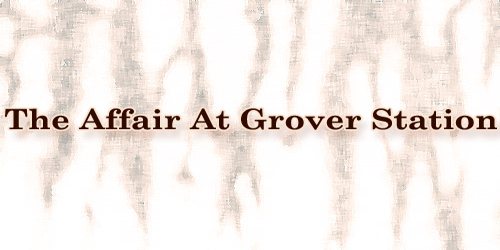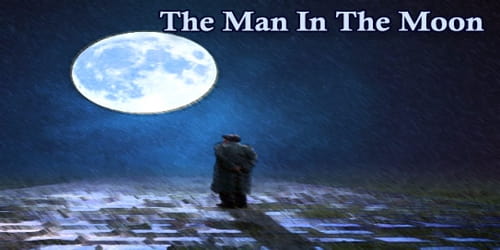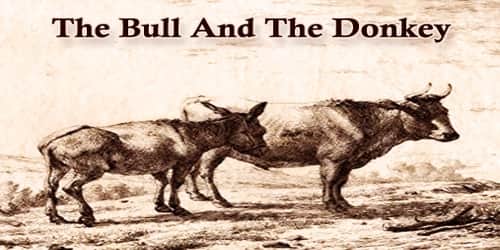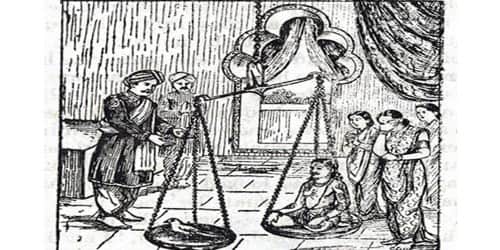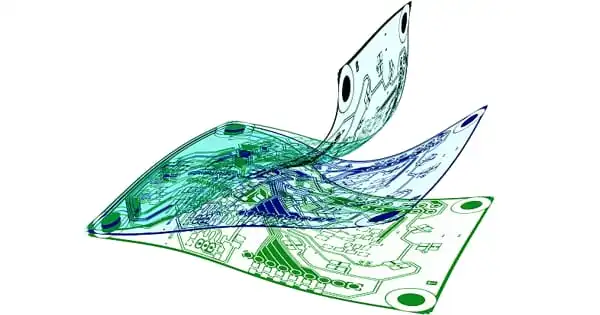I heard this story sitting on the rear platform of an accommodation freight that crawled along through the brown, sun-dried wilderness between Grover Station and Cheyenne. The narrator was “Terrapin” Rodgers, who had been a classmate of mine at Princeton, and who was then cashier in the B railroad office at Cheyenne. Rodgers was an Albany boy, but after his father failed in business, his uncle got “Terrapin” a position on a western railroad, and he left college and disappeared completely from our little world, and it was not until I was sent West, by the University with a party of geologists who were digging for fossils in the region about Sterling, Colorado, that I saw him again. On this particular occasion Rodgers had been down at Sterling to spend Sunday with me, and I accompanied him when he returned to Cheyenne.
When the train pulled out of Grover Station, we were sitting smoking on the rear platform, watching the pale yellow disk of the moon that was just rising and that drenched the naked, gray plains in a soft lemon-colored light. The telegraph poles scored the sky like a musical staff as they flashed by, and the stars, seen between the wires, looked like the notes of some erratic symphony. The stillness of the night and the loneliness and barrenness of the plains were conducive to an uncanny train of thought. We had just left Grover Station behind us, and the murder of the station agent at Grover, which had occurred the previous winter, was still the subject of much conjecturing and theorizing all along that line of railroad. Rodgers had been an intimate friend of the murdered agent, and it was said that he knew more about the affair than any other living man, but with that peculiar reticence which at college had won him the sobriquet “Terrapin,” he had kept what he knew to himself, and even the most accomplished reporter on the New York Journal, who had traveled halfway across the continent for the express purpose of pumping Rodgers, had given him up as impossible. But I had known Rodgers a long time, and since I had been grubbing in the chalk about Sterling, we had fallen into a habit of exchanging confidences, for it is good to see an old face in a strange land. So, as the little red station house at Grover faded into the distance, I asked him point blank what he knew about the murder of Lawrence O’Toole. Rodgers took a long pull at his black briar pipe as he answered me.
Well, yes, I could tell you something about it, but the question is how much you’d believe, and whether you could restrain yourself from reporting it to the Society for Psychical Research. I never told the story but once, and then it was to the Division Superintendent, and when I finished the old gentleman asked if I were a drinking man, and remarking that a fertile imagination was not a desirable quality in a railroad employee, said it would be just as well if the story went no further. You see it’s a grewsome tale, and some way we don’t like to be reminded that there are more things in heaven and earth than our systems of philosophy can grapple with. However, I should rather like to tell the story to a man who would look at it objectively and leave it in the domain of pure incident where it belongs. It would unburden my mind, and I’d like to get a scientific man’s opinion on the yarn. But I suppose I’d better begin at the beginning, with the dance which preceded the tragedy, just as such things follow each other in a play. I notice that Destiny, who is a good deal of an artist in her way, frequently falls back upon that elementary principle of contrast to make things interesting for us.
It was the thirty-first of December, the morning of the incoming Governor’s inaugural ball, and I got down to the office early, for I had a heavy day’s work ahead of me, and I was going to the dance and wanted to close up by six o’clock. I had scarcely unlocked the door when I heard someone calling Cheyenne on the wire, and hurried over to the instrument to see what was wanted. It was Lawrence O’Toole, at Grover, and he said he was coming up for the ball on the extra, due in Cheyenne at nine o’clock that night. He wanted me to go up to see Miss Masterson and ask her if she could go with him. He had had some trouble in getting leave of absence, as the last regular train for Cheyenne then left Grover at 5:45 in the afternoon, and as there was an eastbound going through Grover at 7:30. The dispatcher didn’t want him away, in case there should be orders for the 7:30 train. So Larry had made no arrangement with Miss Masterson, as he was uncertain about getting up until he was notified about the extra.
I telephoned Miss Masterson and delivered Larry’s message. She replied that she had made an arrangement to go to the dance with Mr. Freymark, but added laughingly that no other arrangement held when Larry could come.
About noon Freymark dropped in at the office, and I suspected he’d got his time from Miss Masterson. While he was hanging around, Larry called me up to tell me that Helen’s flowers would be up from Denver on the Union Pacific passenger at five, and he asked me to have them sent up to her promptly and to call for her that evening in case the extra should be late. Freymark, of course, listened to the message, and when the sounder stopped, he smiled in a slow, disagreeable way, and saying, Thank you. That’s all I wanted to know,’ left the office.
Lawrence O’Toole had been my predecessor in the cashier’s office at Cheyenne, and he needs a little explanation now that he is under ground, though when he was in the world of living men, he explained himself better than any man I have ever met, East or West. I’ve knocked about a good deal since I cut loose from Princeton, and I’ve found that there are a great many good fellows in the world, but I’ve not found many better than Larry. I think I can say, without stretching a point, that he was the most popular man on the Division. He had a faculty of making everyone like him that amounted to a sort of genius. When he first went to working on the road, he was the agent’s assistant down at Sterling, a mere kid fresh from Ireland, without a dollar in his pocket, and no sort of backing in the world but his quick wit and handsome face. It was a face that served him as a sight draft, good in all banks.
Freymark was cashier at the Cheyenne office then, but he had been up to some dirty work with the company, and when it fell in the line of Larry’s duty to expose him, he did so without hesitating. Eventually Freymark was discharged, and Larry was made cashier in his place. There was, after that, naturally, little love lost between them, and to make matters worse, Helen Masterson took a fancy to Larry, and Freymark had begun to consider himself pretty solid in that direction. I doubt whether Miss Masterson ever really liked the blackguard, but he was a queer fish, and she was a queer girl and she found him interesting.
Old John J. Masterson, her father, had been United States Senator from Wyoming, and Helen had been educated at Wellesley and had lived in Washington a good deal. She found Cheyenne dull and had got into the Washington way of tolerating anything but stupidity, and Freymark certainly was not stupid. He passed as an Alsatian Jew, but he had lived a good deal in Paris and had been pretty much all over the world, and spoke the more general European languages fluently. He was a wiry, sallow, unwholesome looking man, slight and meagerly built, and he looked as though he had been dried through and through by the blistering heat of the tropics. His movements were as lithe and agile as those of a cat, and invested with a certain unusual, stealthy grace. His eyes were small and black as bright jet beads; his hair very thick and coarse and straight, black with a sort of purple luster to it, and he always wore it correctly parted in the middle and brushed smoothly about his ears. He had a pair of the most impudent red lips that closed over white, regular teeth. His hands, of which he took the greatest care, were the yellow, wrinkled hands of an old man, and shrivelled at the finger-tips, though I don’t think he could have been much over thirty. The long and short of it is that the fellow was uncanny. You somehow felt that there was that in his present, or in his past, or in his destiny which isolated him from other men. He dressed in excellent taste, was always accommodating, with the most polished manners and an address extravagantly deferential. He went into cattle after he lost his job with the company, and had an interest in a ranch ten miles out, though he spent most of his time in Cheyenne at the Capitol card rooms. He had an insatiable passion for gambling, and he was one of the few men who make it pay.
About a week before the dance, Larry’s cousin, Harry Burns, who was a reporter on the London Times, stopped in Cheyenne on his way to ‘Frisco, and Larry came up to meet him. We took Burns up to the club, and I noticed that he acted rather queerly when Freymark came in. Burns went down to Grover to spend a day with Larry, and on Saturday Larry wired me to come down and spend Sunday with him, as he had important news for me.
I went, and the gist of his information was that Freymark, then going by another name, had figured in a particularly ugly London scandal that happened to be in Burns’s beat, and his record had been exposed. He was, indeed, from Paris, but there was not a drop of Jewish blood in his veins, and he dated from farther back than Israel. His father was a French soldier who, during his service in the East, had bought a Chinese slave girl, had become attached to her, and married her, and after her death had brought her child back to Europe with him. He had entered the civil service and held several subordinate offices in the capital, where his son was educated. The boy, socially ambitious and extremely sensitive about his Asiatic blood, after having been blackballed at a club, had left and lived by an exceedingly questionable traffic in London, assuming a Jewish patronymic to account for his oriental complexion and traits of feature. That explained everything. That explained why Freymark’s hands were those of a centenarian. In his veins crept the sluggish amphibious blood of a race that was already old when Jacob tended the flocks of Laban upon the hills of Padan-Aram, a race that was in its mort cloth before Europes swaddling clothes were made.
Of course, the question at once came up as to what ought to be done with Burns’s information. Cheyenne clubs are not exclusive, but a Chinaman who had been engaged in Freymark’s peculiarly unsavory traffic would be disbarred in almost any region outside of Whitechapel. One thing was sure: Miss Masterson must be informed of the matter at once.
‘On second thought,’ said Larry, ‘I guess I’d better tell her myself. It will have to be done easy like, not to hurt her self-respect too much. Like as not I’ll go off my head the first time I see him and call him rat-eater to his face.’
Well, to get back to the day of the dance, I was wondering whether Larry would stay over to tell Miss Masterson about it the next day, for of course he couldn’t spring such a thing on a girl at a party.
That evening I dressed early and went down to the station at nine to meet Larry. The extra came in, but no Larry. I saw Connelly, the conductor, and asked him if he had seen anything of O’Toole, but he said he hadn’t, that the station at Grover was open when he came through, but that he found no train orders and couldn’t raise anyone, so supposed O’Toole had come up on 153. I went back to the office and called Grover, but got no answer. Then I sat down at the instrument and called for fifteen minutes straight. I wanted to go then and hunt up the conductor of 153, the passenger that went through Grover at 5:30 in the afternoon, and ask him what he knew about Larry, but it was then 9:45 and I knew Miss Masterson would be waiting, so I jumped into the carriage and told the driver to make up time. On my way to the Mastersons’ I did some tall thinking. I could find no explanation for O’Toole’s nonappearance, but the business of the moment was to invent one for Miss Masterson that would neither alarm nor offend her. I couldn’t exactly tell her he wasn’t coming, for he might show up yet, so I decided to say the extra was late, and I didn’t know when it would be in.
Miss Masterson had been an exceptionally beautiful girl to begin with, and life had done a great deal for her. Fond as I was of Larry, I used to wonder whether a girl who had led such a full and independent existence would ever find the courage to face life with a railroad man who was so near the bottom of a ladder that is so long and steep.
She came down the stairs in one of her Paris gowns that are as meat and drink to Cheyenne society reporters, with her arms full of American Beauty roses and her eyes and cheeks glowing. I noticed the roses then, though I didn’t know that they were the boy’s last message to the woman he loved. She paused halfway down the stairs and looked at me, and then over my head into the drawing room, and then her eyes questioned mine. I bungled at my explanation and she thanked me for coming, but she couldn’t hide her disappointment, and scarcely glanced at herself in the mirror as I put her wrap about her shoulders.
“It was not a cheerful ride down to the Capitol. Miss Masterson did her duty by me bravely, but I found it difficult to be even decently attentive to what she was saying. Once arrived at Representative Hall, where the dance was held, the strain was relieved, for the fellows all pounced down on her for dances, and there were friends of hers there from Helena and Laramie, and my responsibility was practically at an end. Don’t expect me to tell you what a Wyoming inaugural ball is like. I’m not good at that sort of thing, and this dance is merely incidental to my story. Dance followed dance, and still no Larry. The dances I had with Miss Masterson were torture. She began to question and cross-questions me, and when I got tangled up in my lies, she became indignant. Freymark was late in arriving. It must have been after midnight when he appeared, correct and smiling, having driven in from his ranch. He was effusively gay and insisted upon shaking hands with me, though I never willingly touched those clammy hands of his. He was constantly dangling about Miss Masterson, who made rather a point of being gracious to him. I couldn’t much blame her under the circumstances, but it irritated me, and I’m not ashamed to say that I rather spied on them. When they were on the balcony I heard him say:
‘You see I’ve forgiven this morning entirely.’
She answered him rather coolly:
‘Ah, but you are constitutionally forgiving. However, I’ll be fair and forgive too. It’s more comfortable.’
Then he said in a slow insinuating tone, and I could fairly see him thrust out those impudent red lips of his as he said it: If I can teach you to forgive, I wonder whether I could not also teach you to forget? I almost think I could. At any rate I shall make you remember this night.
Rappelles-toi lorsque les destines Mauront de toi pour jamais spar.
As they came in, I saw him slip one of Larry’s red roses into his pocket.
It was not until near the end of the dance that the clock of destiny sounded the first stroke of the tragedy. I remember how gay the scene was, so gay that I had almost forgotten my anxiety in the music, flowers and laughter. The orchestra was playing a waltz, drawing the strains out long and sweet like the notes of a flute, and Freymark was dancing with Helen. I was not dancing myself then, and suddenly I noticed some confusion among the waiters who stood watching by one of the doors, and Larrys black dog, Duke, all foam at the mouth, shot in the side and bleeding, dashed in through the door and eluding the caterer’s men, ran half the length of the hall and threw himself at Freymark’s feet, uttering a howl piteous enough to herald any sort of calamity. Freymark, who had not seen him before, turned with an exclamation of rage and a face absolutely livid and kicked the wounded brute halfway across the slippery floor. There was something fiendishly brutal and horrible in the episode, it was the breaking out of the barbarian blood through his mask of European civilization, a jet of black mud that spurted up from some nameless pest hole of filthy heathen cities. The music stopped, people began moving about in a confused mass, and I saw Helen’s eyes seeking mine appealingly. I hurried to her, and by the time I reached her Freymark had disappeared.
‘Get the carriage and take care of Duke,’ she said, and her voice trembled like that of one shivering with cold.
When we were in the carriage she spread one of the robes on her knee, and I lifted the dog up to her, and she took him in her arms, comforting him.
“Where is Larry, and what does all this mean?’ she asked. ‘You cant put me off any longer, for I danced with a man who came up on the extra.’
Then I made a clean breast of it, and told her what I knew, which was little enough.
‘Do you think he is ill?’ she asked.
I replied, ‘I don’t know what to think. I’m all at sea.’ For since the appearance of the dog, I was genuinely alarmed.
She was silent for a long time, but when the rays of the electric street lights flashed at intervals into the carriage, I could see that she was leaning back with her eyes closed and the dog’s nose against her throat. At last she said with a note of entreaty in her voice, Can’t you think of anything? I saw that she was thoroughly frightened and told her that it would probably all end in a joke, and that I would telephone her as soon as I heard from Larry, and would more than likely have something amusing to tell her.
It was snowing hard when we reached the Senator’s, and when we got out of the carriage she gave Duke tenderly over to me and I remember how she dragged on my arm and how played out and exhausted she seemed.
“You really must not worry at all,’ I said. ‘You know how uncertain railroad men are. It’s sure to be better at the next inaugural ball; we’ll all be dancing together then.’
The next inaugural ball, she said as we went up the steps, putting out her hand to catch the snow-flakes. ‘That seems a long way off.’
I got down to the office late next morning, and before I had time to try Grover, the dispatcher at Holyoke called me up to ask whether Larry were still in Cheyenne. He couldn’t raise Grover, he said, and he wanted to give Larry train orders for 151, the eastbound passenger. When he heard what I had to say, he told me I had better go down to Grover on 151 myself, as the storm threatened to tie up all the trains and we might look for trouble.
I had the veterinary surgeon fix up Duke’s side, and I put him in the express car, and boarded 151 with a mighty cold, uncomfortable sensation in the region of my diaphragm.
It had snowed all night long, and the storm had developed into a blizzard, and the passenger had difficulty in making any headway at all.
When we got into Grover I thought it was the most desolate spot I had ever looked on, and as the train pulled out, leaving me there, I felt like sending a message of farewell to the world. You know what Grover is, a red box of a station, section house barricaded by coal sheds and a little group of dwellings at the end of everything, with the desert running out on every side to the sky line. The houses and station were covered with a coating of snow that clung to them like wet plaster, and the siding was one deep snow drift, banked against the station door. The plain was a wide, white ocean of swirling, drifting snow that beat and broke like the thrash of the waves in the merciless wind that swept, with nothing to break it, from the Rockies to the Missouri.
When I opened the station door, the snow fell in upon the floor, and Duke sat down by the empty, fireless stove and began to howl and whine in a heartbreaking fashion. Larry’s sleeping room upstairs was empty. Downstairs, everything was in order, and all the station work had been done up. Apparently the last thing Larry had done was to bill out a car of wool from the Oasis sheep ranch for Dewey, Gould & Co., Boston. The car had gone out on 153, the eastbound that left Grover at seven o’clock the night before, so he must have been there at that time. I copied the bill in the copy book, and went over to the section house to make inquiries.
The section boss was getting ready to go out to look after his track. He said he had seen O’Toole at 5:30, when the westbound passenger went through, and, not having seen him since, supposed he was still in Cheyenne. I went over to Larry’s boarding house, and the woman said he must be in Cheyenne, as he had eaten his supper at five o’clock the night before, so that he would have time to get his station work done and dress. The little girl, she said, had gone over at five to tell him that supper was ready. I questioned the child carefully. She said there was another man, a stranger, in the station with Larry when she went in and that though she didn’t hear anything they said, and Larry was sitting with his chair tilted back and his feet on the stove, she somehow had thought they were quarreling. The stranger, she said, was standing; he had a fur coat on and his eyes snapped like he was mad, and she was afraid of him. I asked her if she could recall anything else about him, and she said, ‘Yes, he had very red lips.’ When I heard that, my heart grew cold as a snow lump, and when I went out the wind seemed to go clear through me. It was evident enough that Freymark had gone down there to make trouble, had quarreled with Larry and had boarded either the 5:30 passenger or the extra, and got the conductor to let him off at his ranch, and accounted for his late appearance at the dance.
It was five o’clock then, but the 5:30 train was two hours late, so there was nothing to do but sit down and wait for the conductor, who had gone out on the seven o’clock eastbound the night before, and who must have seen Larry when he picked up the car of wool. It was growing dark by that time. The sky was a dull lead color, and the snow had drifted about the little town until it was almost buried, and was still coming down so fast that you could scarcely see your hand before you.
I was never so glad to hear anything as that whistle, when old 153 came lumbering and groaning in through the snow. I ran out on the platform to meet her, and her headlight looked like the face of an old friend. I caught the conductor’s arm the minute he stepped off the train, but he wouldn’t talk until he got in by the fire. He said he hadn’t seen OToole at all the night before, but he had found the bill for the wool car on the table, with a note from Larry asking him to take the car out on the Q.T., and he had concluded that Larry had gone up to Cheyenne on the 5:30. I wired the Cheyenne office and managed to catch the express clerk who had gone through on the extra the night before. He wired me saying that he had not seen Larry board the extra, but that his dog had crept into his usual place in the express car, and he had supposed Larry was in the coach. He had seen Freymark get on at Grover, and the train had slowed up a trifle at his ranch to let him off, for Freymark stood in with some of the boys and sent his cattle shipments our way.
When the night fairly closed down on me, I began to wonder how a gay, expensive fellow like O’Toole had ever stood six months at Grover. The snow had let up by that time, and the stars were beginning to glitter cold and bright through the hurrying clouds. I put on my ulster and went outside. I began a minute tour of inspection; I went through empty freight cars run down by the siding, searched the coal houses and primitive cellar, examining them carefully, and calling O’Toole’s name. Duke at my heels dragged himself painfully about, but seemed as much at sea as I, and betrayed the nervous suspense and altertness of a bird dog that has lost his game.
‘I went back to the office and took the big station lamp upstairs to make a more careful examination of Larry’s sleeping room. The suit of clothes that he usually wore at his work was hanging on the wall. His shaving things were lying about, and I recognized the silver-backed military hair brushes that Miss Masterson had given him at Christmas time, lying on his chiffonier. The upper drawer was open and a pair of white kid gloves was lying on the corner. A white string tie hung across his pipe rack, it was crumpled and had evidently proved unsatisfactory when he tied it. On the chiffonier lay several clean handkerchiefs with holes in them, where he had unfolded them and thrown them by in a hasty search for a whole one. A black silk muffler hung on the chair back, and a top hat was set awry on the head of a plaster cast of Parnell, Larry’s hero. His dress suit was missing, so there was no doubt that he had dressed for the party. His overcoat lay on his trunk and his dancing shoes were on the floor, at the foot of the bed beside his everyday ones. I knew that his pumps were a little tight, he had joked about them when I was down the Sunday before the dance, but he had only one pair, and he couldn’t have got another in Grover if he had tried himself. That set me to thinking. He was a dainty fellow about his shoes and I knew his collection pretty well. I went to his closet and found them all there. Even granting him a prejudice against overcoats, I couldn’t conceive of his going out in that stinging weather without shoes. I noticed that a surgeon’s case, such as are carried on passenger trains, and which Larry had once appropriated in Cheyenne, was open, and that the roll of medicated cotton had been pulled out and recently used. Each discovery I made served only to add to my perplexity. Granted that Freymark had been there, and granted that he had played the boy an ugly trick, he could not have spirited him away without the knowledge of the train crew.
“Duke, old doggy,’ I said to the poor spaniel who was sniffing and whining about the bed, ‘you haven’t done your duty. You must have seen what went on between your master and that clam-blooded Asiatic, and you ought to be able to give me a tip of some sort.’
“I decided to go to bed and make a fresh start on the ugly business in the morning. The bed looked as though someone had been lying on it, so I started to beat it up a little before I got in. I took off the pillow and as I pulled up the mattress, on the edge of the ticking at the head of the bed, I saw a dark red stain about the size of my hand. I felt the cold sweat come out on me, and my hands were dangerously unsteady, as I carried the lamp over and set it down on the chair by the bed. But Duke was too quick for me, he had seen that stain and leaping on the bed began sniffling it, and whining like a dog that is being whipped to death. I bent down and felt it with my fingers. It was dry but the color and stiffness were unmistakably those of coagulated blood. I caught up my coat and vest and ran downstairs with Duke yelping at my heels. My first impulse was to go and call someone, but from the platform not a single light was visible, and I knew the section men had been in bed for hours. I remembered then, that Larry was often annoyed by hemorrhages at the nose in that high altitude, but even that did not altogether quiet my nerves, and I realized that sleeping in that bed was quite out of the question.
“Larry always kept a supply of brandy and soda on hand, so I made myself a stiff drink and filled the stove and locked the door, turned down the lamp and lay down on the operator’s table. I had often slept there when I was night operator. At first it was impossible to sleep, for Duke kept starting up and limping to the door and scratching at it, yelping nervously. He kept this up until I was thoroughly unstrung, and though I’m ordinarily cool enough, there wasn’t money enough in Wyoming to have bribed me to open that door. I felt cold all over every time I went near it, and I even drew the big rusty bolt that was never used, and it seemed to me that it groaned heavily as I drew it, or perhaps it was the wind outside that groaned. As for Duke, I threatened to put him out, and boxed his ears until I hurt his feelings, and he lay down in front of the door with his muzzle between his paws and his eyes shining like live coals and riveted on the crack under the door. The situation was grewsome enough, but the liquor had made me drowsy and at last I fell asleep.
“It must have been about three o’clock in the morning that I was awakened by the crying of the dog, a whimper low, continuous and pitiful, and indescribably human. While I was blinking my eyes in an effort to get thoroughly awake, I heard another sound, the grating sound of chalk on a wooden blackboard, or of a soft pencil on a slate. I turned my head to the right, and saw a man standing with his back to me, chalking something on the bulletin board. At a glance I recognized the broad, high shoulders and the handsome head of my friend. Yet there was that about the figure which kept me from calling his name or from moving a muscle where I lay. He finished his writing and dropped the chalk, and I distinctly heard its click as it fell. He made a gesture as though he were dusting his fingers, and then turned facing me, holding his left hand in front of his mouth. I saw him clearly in the soft light of the station lamp. He wore his dress clothes, and began moving toward the door silently as a shadow in his black stocking feet. There was about his movements an indescribable stiffness, as though his limbs had been frozen. His face was chalky white, his hair seemed damp and was plastered down close about his temples. His eyes were colorless jellies, dull as lead, and staring straight before him. When he reached the door, he lowered the hand he held before his mouth to lift the latch. His face was turned squarely toward me, and the lower jaw had fallen and was set rigidly upon his collar, the mouth was wide open and was stuffed full of white cotton! Then I knew it was a dead man’s face I looked upon.
“The door opened, and that stiff black figure in stockings walked as noiselessly as a cat out into the night. I think I went quite mad then. I dimly remember that I rushed out upon the siding and ran up and down screaming, ‘Larry, Larry!’ until the wind seemed to echo my call. The stars were out in myriads, and the snow glistened in their light, but I could see nothing but the wide, white plain, not even a dark shadow anywhere. When at last I found myself back in the station, I saw Duke lying before the door and dropped on my knees beside him, calling him by name. But Duke was past calling back. Master and dog had gone together, and I dragged him into the corner and covered his face, for his eyes were colorless and soft, like the eyes of that horrible face, once so beloved.
“The blackboard? O, I didn’t forget that. I had chalked the time of the accommodation on it the night before, from sheer force of habit, for it isnt customary to mark the time of trains in unimportant stations like Grover. My writing had been rubbed out by a moist hand, for I could see the finger marks clearly, and in place of it was written in blue chalk simply,
- B. & Q. 26387.
“I sat there drinking brandy and muttering to myself before that blackboard until those blue letters danced up and down, like magic lantern pictures when you jiggle the slides. I drank until the sweat poured off me like rain and my teeth chattered, and I turned sick at the stomach. At last an idea flashed upon me. I snatched the waybill off the hook. The car of wool that had left Grover for Boston the night before was numbered 26387.
“I must have got through the rest of the night somehow, for when the sun came up red and angry over the white plains, the section boss found me sitting by the stove, the lamp burning full blaze, the brandy bottle empty beside me, and with but one idea in my head, that box car 26387 must be stopped and opened as soon as possible, and that somehow it would explain.
“I figured that we could easily catch it in Omaha, and wired the freight agent there to go through it carefully and report anything unusual. That night I got a wire from the agent stating that the body of a man had been found under a woolsack at one end of the car with a fan and an invitation to the inaugural ball at Cheyenne in the pocket of his dress coat. I wired him not to disturb the body until I arrived, and started for Omaha. Before I left Grover the Cheyenne office wired me that Freymark had left the town, going west over the Union Pacific. The company detectives never found him.
“The matter was clear enough then. Being a railroad man, he had hidden the body and sealed up the car and billed it out, leaving a note for the conductor. Since he was of a race without conscience or sensibilities, and since his past was more infamous than his birth, he had boarded the extra and had gone to the ball and danced with Miss Masterson with blood undried upon his hands.
“When the I saw Larry O’Toole again, he was lying stiff and stark in the undertakers rooms in Omaha. He was clad in his dress clothes, with black stockings on his feet, as I had seen him forty-eight hours before. Helen Masterson’s fan was in his pocket. His mouth was wide open and stuffed full of white cotton.
“He had been shot in the mouth, the bullet lodging between the third and fourth vertebrae. The hemorrhage had been very slight and had been checked by the cotton. The quarrel had taken place about five in the afternoon. After supper Larry had dressed, all but his shoes, and had lain down to snatch a wink of sleep, trusting to the whistle of the extra to waken him. Freymark had gone back and shot him while he was asleep, afterward placing his body in the wool car, which, but for my telegram, would not have been opened for weeks.
“That’s the whole story. There is nothing more to tell except one detail that I did not mention to the superintendent. When I said goodbye to the boy before the undertaker and coroner took charge of the body, I lifted his right hand to take off a ring that Miss Masterson had given him and the ends of the fingers were covered with blue chalk.”
Written by Willa Cather
